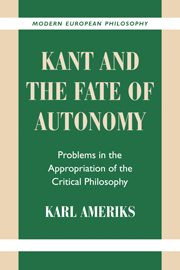Introduction: Kant and the Fate of Autonomy
Published online by Cambridge University Press: 05 June 2012
Summary
How it could happen that a whole epoch of philosophers, from Reinhold to Hegel, was of the opinion that philosophy must be deduced from one proposition – this has still remained unclear to me, and I have as yet found no answer for it in the literature.
Near the end of his life, a public challenge was issued to Kant in the anonymous review of an obscure work, Johann Gottlieb Bohle's Entwurf der Transcendental-Philosophie (Göttingen, 1798):
Kant is the first teacher of Transcendental Philosophy and Reinhold the admirable disseminator ofthe critical doctrine; but the first true transcendental philosopher is undeniably Fichte. For Fichte has realized what the Critique proposed, carrying out systematically the transcendental idealism which Kant projected. How natural therefore is the public's desire that the originator of the Critique declare openly his opinion of the work of his worthy pupil!
In an unusual public reply, Kant issued an impassioned statement that insisted on distinguishing the latest fashions from “the common standpoint” of his own philosophy:
Since the reviewer finally maintains that the Critique is not to be taken literally in what it says about sensibility and that anyone who wants to understand the Critique must first master the requisite standpoint (of Beck or of Fichte), because Kant's precise words, like Aristotle's, will destroy the spirit, I therefore declare again that the Critique is to be understood by considering exactly what it says and that it requires only the common standpoint that any mind sufficiently cultivated in abstract investigations will bring to it.
- Type
- Chapter
- Information
- Kant and the Fate of AutonomyProblems in the Appropriation of the Critical Philosophy, pp. 1 - 34Publisher: Cambridge University PressPrint publication year: 2000

